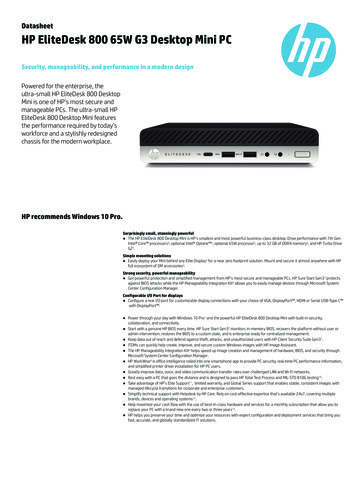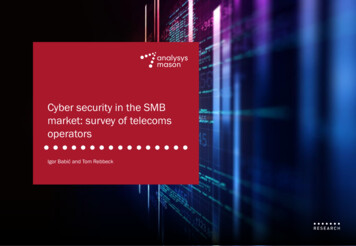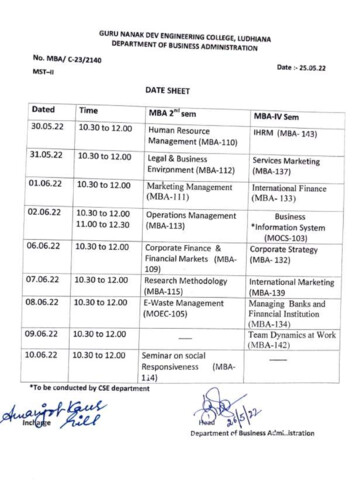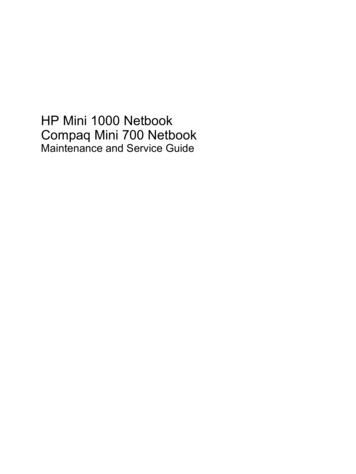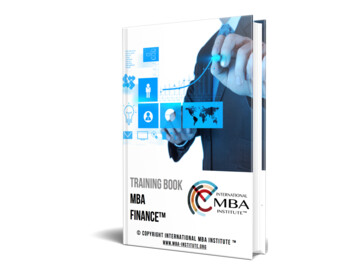
Transcription
Mini-MBA inTelecomsReal skills for real engineers
MINI-MBA INTELECOMS– a Blueprint for Leading Future BusinessA comprehensive programme covering all the essential elements needed to effectively lead and managein Telecoms and related industries.Focused Modules:
PROGRAMMESUMMARYA BLUEPRINT FOR LEADINGEFFECTIVE TELECOMS BUSINESS:The Mini-MBA in Telecoms explores the key areas for business success, bringing the conceptstogether within a comprehensive team-based business simulation that runs throughout theprogramme - allowing the ideas to be developed and applied to a realistic and challenging simulatedenvironment. Use the separate Blueprint document to collate and organise your ideas Follow the format to generate a Blueprint that you can continue to develop andhone over the coming months and years Use it on this programme to inform and lead your thinking for the group presentation. Keep it – develop it – regularly assess it – and align it with your activities Use it as a template for your teams and colleaguesThis programme delivers comprehensive training for mid-senior managers, directors, specialists,consultants and identified talent working within the telecommunications, connected innovation,and adjacent industries.Mini-MBA in Telecoms: Key benefits: Rapidly build and expand your knowledge and competencies in the key areas of telecoms business.Establish a Blueprint for effectively leading your business, department or team.Implement all key aspects of the blueprint consistently and coherently.Develop more effective strategies, key performance enablers, and business models.Focus on maximising value creation for your organisation and your customers.Make better business decisions.Develop a solid understanding of telecoms technology and deployment options and how thisimpacts the business. Break those silo barriers. Better lead, support, and enhance the performance of your people and teams. Take a more active role in evolving company culture, innovation and processes. Assess ideas and opportunities more rigorously and take a more dynamic leadership role.Who should attend?The programme is ideal for those in a telecoms-related management, leadership,orconsultancy position within: Corporate organisations (including blue-chip companies), working to . grow and develop new and existing departments or divisions align departments or divisions to corporate strategy and vision Growing businesses that are making the transition to a sustainable long-termproposition Start-up departments and spin-off teams
PROGRAMME FOCUS- What you’ll coverTHE PROGRAMME- Delivery OptionsDuring the Mini-MBA inTelecoms programme you’llcover modules of thefollowing focused topicsareas:Face-to-Face, Live Virtual Classroom or BlendedOur programmes are designed to ensure an optimal learning experience whetherdelivered face-to-face in a classroom, live online over our virtual classroom platform oras a blended solution.Our team of highly experienced trainers have the skills and experience to deliver knowledge and developthe competencies you need to succeed.Business Simulation Bringing it all togetherThe business simulation andexercises are designed sothat participants can developtheir competences and applytheir learning and ideas totheir own areas of businesswithin the widertelecoms context. It fullyreflects the current areas offocus in telecoms, includingbusiness models centred onadvanced technologies suchas 5G, high performanceconnectivity, cloud and IoT.Choose your preferred delivery method: Face-to-Face - We’ll send our team of hand-picked team of specialists to deliver theprogramme at a time and location of your choice. Live Virtual Classroom - 100% online, instructor-led training delivers the same greatcollaborative learningexperience without the need to travel. Blended Learning - We can combine the best elements of digital and face-to-facetraining. This hybrid approach delivers the perfect mix of effective and convenienttraining.Flexible Delivery SchedulesWe have designed the Mini-MBA in Telecoms programme to be adaptableand fit in with your organisations work patterns. The programme can be deliveredeffectively as:
THE PROGRAMME- Detailed Course ContentsTHE PROGRAMME- Detailed Course ContentsModule 1Industry, Business & TechnologyInsightModule 2Strategy & Business Model DevelopmentTelecoms Industry & Business Dynamics Telecoms Business Environment Sectors and Organisation Types Regulation and Licensing Stakeholders Standardisation and Industry Bodies Assets and the Basis of Competition Business Models – Big PictureThe Technology Explained and Evaluated Technology Principles Services, Transmission, Switching, Signalling /Control, and Support Systems Key Technology Requirements and Evolution Fixed Access Systems Radio Access Systems and Architectures Core Network - Architectures and OptionsTelecoms Business Simulation / Exercise –Key Performance EnablersTelecoms Industry & Market Update Industry Direction, Market Drivers andDisruption Key Global Trends – Telecoms and Connectivity Telco Brands - Global vs Regional Key Global Trends – Financial KPIs Vendors Technology Trends – Big Picture The 5G Focus 5G Use Cases 5G in Support of Connected Innovation M2M, IoT, IoE and Industrial Internet IoT / Wireless Connectivity Options andTechnologies Wi-Fi and Complementary Technologies Emerging Digital EcosystemsKey Performance Enablers Aligning with Strategy / CompetitiveAdvantage Business Agility Innovation Capability Stakeholder Risk ProfileAnalysing the Market: Developing Strategy & Competitive Advantage Understanding the Nature of Strategy Carrying Out Strategic Analysis Developing the Strategy Strategy ExecutionExercises and Case Studies Positioning for Competitive Advantage KPIs – Thinking Differently Gaining Momentum in Strategy Execution Setting OKRs The Strategy Canvas – Aligning the Business ModelEvaluating and Optimising the Business Model(s) Definitions and Components of a Business Model Business Models – Assessment and DevelopmentTelecoms Business Simulation / Exercise– Analysing & Developing Successful Business Models
THE PROGRAMME- Detailed Course ContentsTHE PROGRAMME- Detailed Course ContentsModule 3Finance, Analysis and ControlModule 4Getting Things DoneModule 4Telecoms Business Simulation / Exercise – Assessing Leadership StyleCorporate Finance – the Financial Cycle andReporting Key Accounting Concepts The Company Operating (Finance) Cycle Three Principal Accounting DocumentsLeadership in Business / Organisations Defining Leadership Leadership vs Management Activities Identifying Great Leaders Attributes, Characteristics and Traits of GreatLeaders Reflecting Leadership – Setting Standards Successful People / Organisations You Assessing Your Position The Chaotic Leadership Environment Controlling Focus Role of the Leader in Business (includingProject Globe) Dominance vs Leadership Understanding Power and Power-Distance Behavioural Leadership Choices Authenticity – Why it Matters Building Functional Confidence as a Leader Leading in the 21st Century - VUCA Taking Action – Getting Things Done Tasking Teams and Individuals Using Objectives and Key Results (OKRs) as aFrameworkDeveloping Effective Teams The Importance of Teamworking The Key to Leading Teams – Understanding People Different Views of the World Understanding Motivation People Working Together Analysing the Team – Personality Models and Team Roles (Exercise – Team Role Analysis / Inventory (Optional)) Mapping Thinking Styles / Preferences to Team Roles Team Goal Setting, Progress and Performance Role of the Team Leader – 8 Cs Dysfunctional Teams Building and Strengthening the Team Partnerships, Value Webs and Ecosystems Mergers and Acquisitions – Culture & People IssuesKPIs, Ratios and Financial Analysis Understanding Finance Key Financial Ratios – Categories andExamples Profitability Efficiency Equity, Loans, and Gearing / Leverage Valuation - Controlling InvestmentWorked Example Reading and Understanding Annual ReportsTelecoms Business Simulation / Exercises – Valuation,
THE PROGRAMME- Detailed Course ContentsModule 4Influence and Communication Leading and Working with Others Understanding People Communication and Building Trust (with TrustCircles) Influence – Getting Specific Influencing Others – Towards Charisma (withToolsand Examples) The Role of Emotion in Building Rapport Storytelling, Neuroscience, and Emotion Storytelling in Business – Functional\StorytellingTHE PROGRAMME- Detailed Course ContentsTelecoms Business Simulation / Exercise –Influencing OthersModule 5Creating and Communicating Compelling Customer PropositionsDeveloping Culture & Innovation Supporting and Deploying Effective People –Culture and Innovation Getting the Right Things Done – Impact The Effective Human Resource Understanding All the Key Elements Understanding and Developing Competencies Developing the Culture Developing a Support Framework Innovation and Innovative Thinking Recruitment and Career Advancement – KeyEnablers Assessments General Conduct and the CommunicationsFramework Workplace Conflict Resolution Project Management Choices – 4PsCreating Compelling Customer Propositions Customers – Making Critical Choices Strategy and the Customer Proposition Customer Segments Products Brand Components of a Brand Pricing Expectation and Consistency The 80/20 Golden RuleTelecoms Business Simulation / Exercise– Guiding Statements for an Innovative BusinessTelecoms Business Simulation / Exercise – Product DevelopmentCommunicating Compelling Customer Propositions Channels to Market Key Elements of the Marketing Message The Psychology of Persuasion Segments, Profiles & Emotion Marketing Communications On-Line Marketing Marketing Systems and Frameworks Customer Retention and Loyalty
THE PROGRAMME- Detailed Course ContentsModule 5Telecoms Business Simulation / Exercise –Product DevelopmentCommunicating Compelling CustomerPropositions Marketing Communications Plan Developing a Marketing Communications Plan Developing a Campaign for Lead Generation /Sales Assessing the Marketing and CommunicationsPlan - KPIs International Marketing Market Research Marketing ResourcesSales and Business Development Linking Marketing and sales – Lead Generation Sales – Common Objections Overcoming Common Objections Establishing a Sales Decision Process Responding to RFPsTHE PROGRAMME- Detailed Course ContentsGovernance (Discussion) – Doing the RightThingsModule 6Optimising Operations and TransformationMaintaining Effective Governance Health and Safety Data Protection Ethical Financial Reporting Employment Practices Charity / Social Engagement Environment and Sustainability Aligning with the UN Sustainable DevelopmentGoals Consequential Thinking – The Four-Way Test Sustainability – Example Approaches Telecoms Business Simulation / Exercise –GovernanceOptimising Operations and TransformationKey Principles – Optimising Operations and TransformationThe Issue of Company MomentumMomentum – the Impact of Corporate Culture and DNAMomentum – Impact of Corporate Attitude to RiskMomentum and Risk – the ResultsResistance to Change – IllustratedUnderstanding the Nature of ChangeChange – Understanding the TriggersChange – a Non-Stop JourneyEvolving to Stay Relevant and OptimisedTelecoms Business Simulation / Exercise – Future Position
15 Georgian Cres ct Us: 27 (0) 10 494 9918
The Mini-MBA in Telecoms explores the key areas for business success, bringing the concepts . Blended Learning - We can combine the best elements of digital and face-to-face training. This hybrid approach delivers the perfect mix of effective and convenient . Linking Marketing and sales - Lead Generation Sales - Common .



